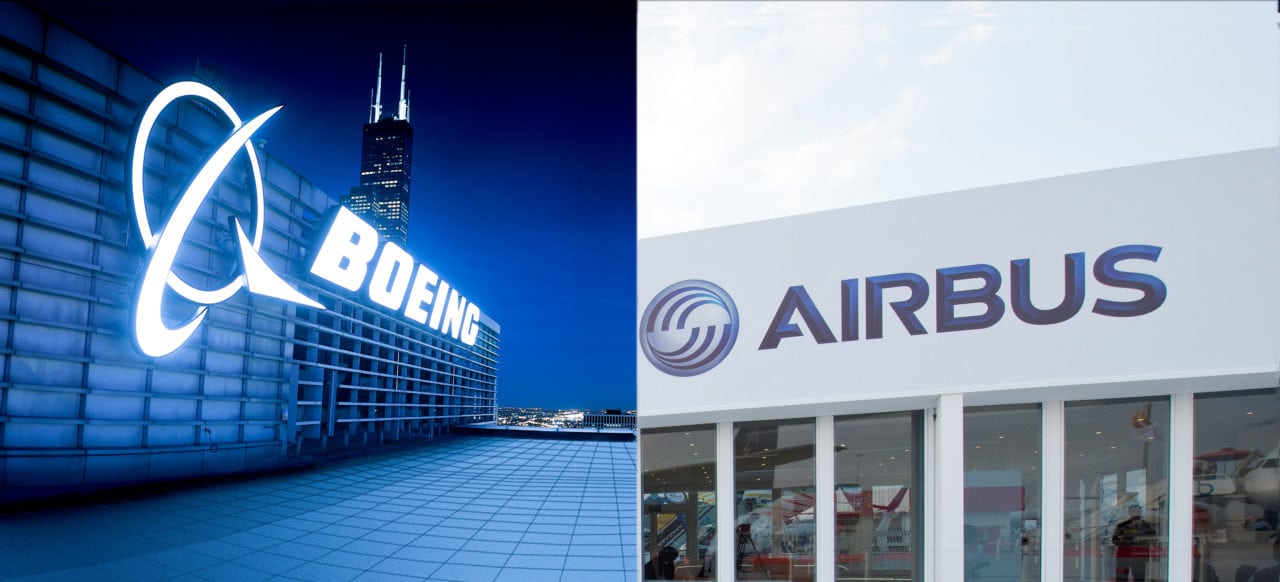
The 12-year Boeing/Airbus saga in front of the World Trade Organization is finally winding down. Photos courtesy of Boeing, Airbus
The World Trade Organization (WTO) Tuesday found that the European Union has failed to honor multiple previous rulings and has provided more than $22 billion of illegal subsidies to European aircraft maker Airbus aiding in the company’s A350 and A380 development.
This ruling by the WTO Appellate Body is the final decision in this case, which was initiated in 2006. Today’s decision ends the dispute and clears the way for the United States Trade Representative (USTR) to seek remedies in the form of tariffs against European imports to the U.S.

Airbus received illegal government subsidies for a50 and a380 development according to the WTO. (Airbus)
The authorized tariffs are likely to total billions in duties per year, unless and until Airbus addresses the illegal subsidies it received from European governments for its most recently launched airplanes. It is anticipated that U.S. tariffs will be authorized up to the amount of annual harm the subsidies are determined to cause. Tariffs could be scheduled as early as 2019. This is expected to be the largest-ever WTO authorization of retaliatory tariffs.
“Today’s final ruling sends a clear message: disregard for the rules and illegal subsidies is not tolerated. The commercial success of products and services should be driven by their merits and not by market-distorting actions,” said Boeing head Dennis Muilenburg.
The WTO ruling did reverse parts of a 2016 decision, finding no fault in the development of the A320 and A330 jets. For its part, Airbus emphasized that the “WTO has now dismissed in their entirety 94% of Boeing’s original claims” and focused on the “much more interesting part — on Boeing’s more egregious and competition-damaging subsidies,” which the WTO has not yet finished ruling on.
The EU has brought two such cases against the U.S. One case ended in favor of the U.S., and in the other, like in the Airbus case, the majority of the allegations the EU made against the U.S. and Boeing were dismissed.

The remaining claim in front of the WTO alleges illegal tax breaks for the 787 and 777. (Boeing)
To Airbus’ point, one finding against the U.S. now remains before the WTO, which concerns a Washington state tax measure. It is under appeal and should be decided within the next year. Airbus alleges $13.7 billion in illegal tax breaks for Boeing between the 787 and 777 aircraft.
“The result is simple: Airbus pays back its loans, Boeing pays back nothing and continues to exploit the generosity of the U.S. taxpayer,” outgoing Airbus CEO Tom Ender said. “Despite Boeing’s rhetoric, it is clear that their position today is straightforward healthy: they have half the market and a full order book, they have clearly not been damaged by Airbus repayable loans.”
Airbus General Counsel John Harrison said: “Airbus recognizes the importance of the WTO and the Appellate Body’s findings and will do what is necessary to correct any errors and this report confirms the efforts we are making. We likewise expect Boeing to take note when it comes to its compliance obligations. Boeing has in the past shown complete disregard by ignoring the recommendations and continuing with their illegal behavior.
“Boeing is now at more than 90% failed claims. This is proof of Boeing’s cynical PR motives in bringing this case about in the first place. It shatters Boeing’s claim it perpetuated for years that their WTO case undermines European industrial-government partnership.”
This finding closes a long chapter on Boeing claims against Airbus, but Airbus is pinning its hopes on a ruling against Airbus in its final claim. Without that, the additional loan repayment penalties, potential tariffs and public perception scorecard will put the European company at a significant disadvantage in its stated goal of dethroning the American company as the world’s top aerospace company.